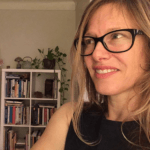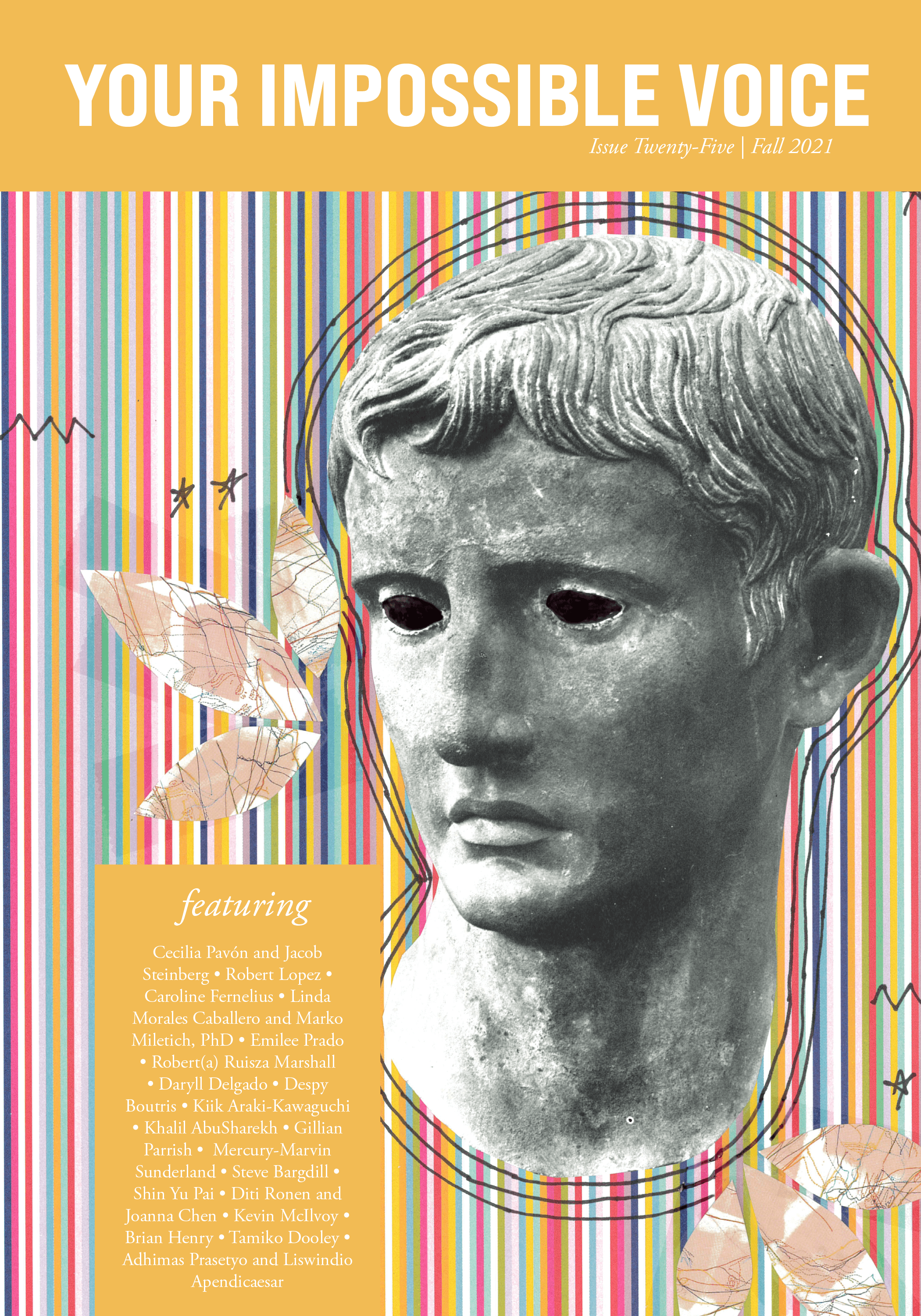Issue 25 | Fall 2021
Weatherman
Gillian Parrish
When he wakes, he wakes in sweat, wakes in panic, turns to see if she’s in pain, if she wants water or his warm hand on her back, but she’s not there, and his heart falls into his stomach and he remembers, and it is another morning, time to rise and dress and enter the cold kitchen and drive the day away.
—❉—
Between the car and the depot his heart starts pounding and his breath comes fast, shallow. When he boards the bus, he sits for a minute, breathes slow, takes out the small spiral notebook, marks the time and symptoms as the doctor ordered. It’s like keeping score. But for a game there is no name for.
As he drives up North and South, the sun rises, streaming gold through the junipers and oaks, turning the headstones amber. He’d like to lay down under those trees, pull the blanket of grass and earth up over him.
He drives a while, picking up weary shift-workers he knows by name, and a tired-looking pregnant woman he doesn’t know, trailed by her two small kids, everyone heading east. At the covered stop on Page near the big shopping center, he lowers the bus down like a camel bent to kneel against the curb. Alice climbs up, pushing down hard on her cane, dragging her shopping trolley.
“Morning, James,” she says, her worn voice a warm hum. Says she’s sorry to move so slow, that she’s feeling the storm front in her bones. He tells her to take her time, thinks of his own knees and feet and fingers burning as if broken glass is caught in his joints.
Alice takes her usual seat at the front, next to the woman and her kids. “You eating good, James? You look too skinny.” He smiles and says he sure tries to. And thinks about dinnertime and the silence of the house.
At the stoplight on Hanley, he watches the kids in the rearview mirror. The little girl peers into a glass marble she holds up to catch the sunlight, singing in a high, fine voice, “It’s a small world, it’s a small world, it’s a small small small small worrrrrld.” Her little brother attacks her shoulder with a plastic dinosaur and a garbled roar, “And then you diiiie!” Alice half-laughs a low “Indeed!” The kids both stop. Stare, rapt. “Then flowers grow,” she says conspiratorially, and pulls two daisies from a bouquet crowning one of her grocery bags. “Go on, give them to your mama. Go on. That’s right.” The light changes, so he misses the look on the mother’s face.
—❉—
Lunch is an apple and ham on rye. He always made the lunches while Luce made them breakfast. He used to surprise her sometimes with a flower or a movie ticket tucked in her lunch bag. She’d come home and kiss him, and they’d dance in the kitchen, her hands pressed to his chest. The bread is now dry in his mouth. Thick August sunlight floods the bus windows. Hazy orange day. Bad day for breathing.
The phone buzzes in his pocket. Nina. “Weatherman,” she says, and his heart leaps a little, hurts; it’s what Luce had always called him, then Nina too. He was the one to watch the weather, to call out “pack umbrellas” or “grab your gloves.” Nina is telling him she just came across a new weather app, Forecaster. Says he’d like it. Says she is tired, but she’s learning a lot. He’s glad that Luce had been there to see it when Nina got the residency. “You take your place, honey,” she’d say. She knew what that meant too, head nurse so many years. He thought of the sweet hard line between her eyebrows.
But now Nina is talking, asking him if he will play ball this week. And is he eating right. He drawls soft answers. “I am.” “Oh, you know.” She lets his words float in the air awhile. Like her mother, she can read his silences the way he can read clouds. She says he is not telling her something. He says, “No ma’am.” She says she’ll call on the weekend. He says he’d like that. She makes him download the app before she has to go.
—❉—
He likes to get to the ballfield early, to smell the grass and feel the weather—spring sun on his skin, summer heat steaming up from the field, autumn wind riddled with the first hints of cold. Tonight, he sits on the bleachers between the harvest moon rising and the sun sinking deeper into the trees. Red sky at night, he thinks. His throat is tight; he takes a swig of water. Remembers Nina at nine, how she loved to hand out Gatorade in the dugout. Her funny call today. Forecaster. He takes out his phone to look. And, yes, it is a small wonder, the world in his pocket, how he can see the weather from here to Timbuktu, on to Tehran and Taipei. Colored swathes of red and white, orange and green and blue, that mean ozone or cloud, temperature, wind gust, dew point.
An ad scrolls by slow, an old-time airplane pulling a sign, “Miracle Supply Company,” then the sky becomes a puddle mirroring sky, and now a puddle rainbow-slicked with oil. And the screen pulls back, and the puddle is in the middle of a road and a woman’s voice is murmuring in a cinnamon tone, and she rises up out of the puddle, and he knows why Nina likes this thing, his child with her lifelong flair for drama. For this is a witchy woman, long dreads glinting with silver threads, silver bracelets ringing her dark arms, silver teeth flashing. She is saying something he can’t make out, her words swallowed by the storm. She is walking towards the camera, her long dress thrashing in the rising wind, the road under her green shoes rippling with water, and now water is climbing her calves as the road turns into a river. She keeps coming closer, as the water rises to her waist, and he hears her purr, “Flash flood at ten,” and then Gene is slapping him on the shoulder, saying, “Hey Bus! Where you been?” And it is time to throw.
He almost made it home before it happened.
—❉—
The car still smells of urine in the morning, though he’d washed and sprayed the seat and folded one of their old towels on it. He shakes his head in shame as he starts the car. At least Luce wasn’t there to worry. Though she’d be pushing the doctor to figure it out. The doctor says it may be autoimmune, and autoimmune may be triggered by grief, that grief can open the door for things. They keep running tests, but nothing shows.
On the bus, he checks the time on his phone. Still enough to read the headlines. Another billionaire spaceship, another Black child, who could be his own, killed walking home by cops, another dustbowl, another hurricane, families pouring north fleeing war or famine, locked up at borders or drowned at sea, children stiff-armed, screaming, children dead on the beaches. His throat is tight.
He taps the app and the screen fills with the cracked, lizard-skin landscape of a drought-struck field. The woman is walking towards the camera, her green shoes kicking up red dust. She is saying something in that warm murmur, coming closer and closer, until finally her face fills the screen, her plump lips cracked in the heat of that place. “Dry mouth all day,” he thinks he hears her say, but the other buses are roaring to life around him, so he isn’t sure.
—❉—
He can’t sleep again. He sees pieces of the day: so many weary faces and bodies slumped in the seats and his own burning thirst, unmet all day for fear of pissing himself again.
His doctor said to sit up when it gets like this, said don’t try to sleep. His phone says 4 a.m. He opens the app.
And she’s there, walking out of a forest on fire, and his eyes are burning, streaming water, and she’s murmuring, “Fires in the west.”
And now she’s in the yellow-gray haze of a city packed with traffic. “Bad air,” she whispers, and he can hardly breathe.
And now she’s on a prairie, a tornado at her back, and he’s dizzy.
And she’s in dry riverbed, and she’s standing in a hard rain, and in the eye of a hurricane, a great wall of cloud curling around her, the sky a circle of blue calm above, and she’s saying, “It takes some time to see.”
Now glaciers are falling behind her and now his heart is pounding, and she is back in the yellow smog city and he can feel the pull of billions trying to breathe, and he can feel the water rising in the wrong place and the rain not falling in the right place and he is no longer alone, and he knows all this will surely kill us.
About the Author
 Gillian Parrish serves as assistant professor at Lindenwood University. She’s published stories, essays, and poems in various journals and anthologies, as well as two books of poems, the latest of which is supermoon. In her free time, on odd holidays like solstice, equinox, May Day, and Fool’s Day, she launches issues of spacecraftproject.com, a journal of stories and poems that also features interviews with artists working with words, sound, and movement, paint and pixel, light and land.
Gillian Parrish serves as assistant professor at Lindenwood University. She’s published stories, essays, and poems in various journals and anthologies, as well as two books of poems, the latest of which is supermoon. In her free time, on odd holidays like solstice, equinox, May Day, and Fool’s Day, she launches issues of spacecraftproject.com, a journal of stories and poems that also features interviews with artists working with words, sound, and movement, paint and pixel, light and land.
Prose
Bomarzo Cecilia Pavón, translated by Jacob Steinberg
Sister in Basement, Manny Again Elsewhere Robert Lopez
Visitations Caroline Fernelius
Solution Linda Morales Caballero, translated by Marko Miletich, PhD
Auditions for Interference Theory Emilee Prado
Life Stories Robert(a) Ruisza Marshall
Out There Daryll Delgado
The Embassy Khalil AbuSharekh
Shaky From Malnutrition Mercury-Marvin Sunderland
Weatherman Gillian Parrish
The Taco Robbers From Last Week Steve Bargdill
Poetry
Epigenetics Diti Ronen, translated by Joanna Chen
i once was a witch Kiik Araki-Kawaguchi
Thralls Kevin McIlvoy
Mine Brian Henry
Catastrophic
marble chunk Shin Yu Pai
shelf life
Rebirth Tamiko Dooley
Before the Jazz Ends Adhimas Prasetyo, translated by Liswindio Apendicaesar
After Jazz Ends
Scent of Wood
Cover Art
Untitled Despy Boutris

